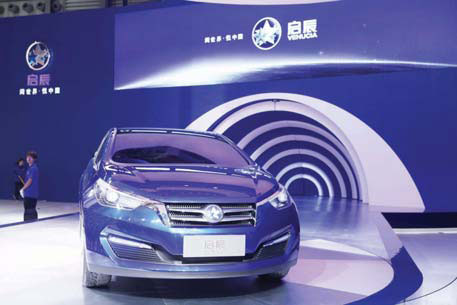China market retained auto sales crown
 0 Comment(s)
0 Comment(s) Print
Print E-mail
China Daily, January 9, 2012
E-mail
China Daily, January 9, 2012
 |
|
New Venucia brand auto [Photo/China Daily] |
 |
|
Kumho Tires are factory fitted on many models. [Photo/China Daily] |
Warranty regulation
In October, the General Administration of Quality Supervision, Inspection and Quarantine held a public hearing on a draft regulation covering automobile warranties. If adopted, the measure would entitle car buyers to free repair, replacement and even return of faulty cars in the first two years or 40,000 kilometers of ownership.
The most controversial clause in the draft states consumers have the right to return a vehicle within 30 days due to serious quality problems such as severe cracking in the car body, non-functioning brakes or steering and oil leaks.
Under the current system, customers can in practice never demand a replacement or return a car once they buy it.
Representatives of both consumers and auto companies at the hearing agreed that a third-party agency is needed to inspect claimed quality problems and judge disputes.
Following the hearing, the General Administration of Quality Supervision, Inspection and Quarantine said it will take time to revise the draft and will release a final law, but did not give a timetable.
Duties on US-made cars
The Ministry of Commerce announced anti-dumping and anti-subsidy duties on some vehicles imported from the United States with engines larger than 2.5 liters starting from Dec 15 and lasting two years.
Affected automakers include General Motors, Chrysler, BMW, Mercedes-Benz and Honda.
GM and Chrysler face anti-dumping duties of 8.9 and 8.8 percent as well as anti-subsidy duties of 12.9 and 6.2 percent.
The US units of German automakers BMW and Mercedes-Benz will have anti-dumping duties of 2 and 2.7 percent imposed. Honda's US operations will also be subject to a 4.1 percent tariff. Other carmakers are also subject to the levies, but the ministry did not name them in its announcement.
The decision was seen as China's response to US tariffs on China-made tires.
Analysts said Chrysler will be most affected since it has no local production and relies solely on imports for sales in China.
But they note the impact is not likely to be big because Chinese buyers of large imported vehicles are not extremely price sensitive as they already pay a hefty 25 percent import duty.
Local R&D centers
As China carries more weight in the global auto market, foreign carmakers have opened local R&D facilities to better respond to domestic consumer demands.
In October, Toyota broke ground for an R&D center in Changshu, a city near Shanghai, its sixth and largest worldwide. Total investment in the facility that covers 2.3 million square meters is about $689 million.
Scheduled to be completed in the middle of 2013, the wholly owned R&D unit of Toyota will include several advanced testing tracks and laboratories for materials technology, electronics, the environment, safety and traffic systems.
One major task of the center is to realize production of hybrid vehicles and core parts in China.
General Motors also has a technical center under construction in Shanghai. When completed in the last half of 2012, the 65,000-square-meter center will have more than 300 employees, 62 testing labs and nine research facilities.
Luxury carmakers Mercedes-Benz and Audi both set up design facilities in China last year to better meet local preferences and use local inspiration in more global models.
Quake rattles sales
A devastating earthquake and tsunami hit Japan in March and forced most carmakers and component manufacturers to halt production, which in turn disrupted supplies to plants outside the country, including in China.
Only in July did Toyota and Honda's China joint ventures approach pre-earthquake levels of production. For the rest of the year, the carmakers worked hard to recoup sales lost in the previous months.
Toyota moved about 883,000 vehicles on the Chinese mainland in 2011, up 4 percent year on year. The company said in a statement that its sales target for this year will increase more than 10 percent to clear the 1-million benchmark.
Honda has yet to release full-year figures, but it is likely to report that sales fell from a year earlier.
Mazda registered a 10 percent decline in its 2011 China sales to some 215,000 vehicles. The company vowed rapid growth this year by expanding its product lineup and dealer network.
Nissan's China operations were the least affected of Japanese carmakers due to its highly localized vehicle content, open supplier system and quick maneuvering of global resources.
Though its whole-year tally has not been released, the carmaker reported 21 percent growth in sales by the end of November.
First national tire recall
South Korea's' Kumho Tires began a recall of more than 300,000 tires in China on April 15 after a China Central Television report said the company's Tianjin plant used excess recycled rubber in its products.
The company initially denied the charge and called the report "inaccurate", but later apologized on television and submitted notification to the national quality watchdog for a nationwide recall. It is the first-ever recall on auto tires in China.
One of the largest tire manufacturers in China, Kumho supplies many Sino-foreign car joint ventures including Shanghai GM, FAW Volkswagen, Beijing Hyundai, Dongfeng Yueda Kia and Dongfeng Peugeot Citroen, as well as domestic carmakers FAW Car, Chery Automobile, Great Wall Motors and Hafei Auto.
Three automakers - Dongfeng Yueda Kia, Beijing Hyundai and Great Wall Motors - then announced the recall of 75,800 vehicles equipped with affected Kumho tires.





